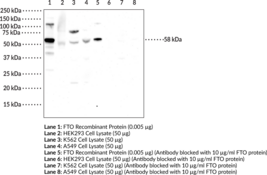Territorial Availability: Available through Bertin Technologies only in France
- Correlated keywords
- Alk-B nonheme Runx1-t1 Runx-1t1 Srsf-2 U6 Small Nuclear RNA (2′-O-Methyladenosine-N6-)-Demethylase m6A(m) Methyl Adenine Single-nucleotide polymorphisms
- Product Overview:
Fat mass and obesity-associated (FTO) protein is a nuclear-residing N6-methyladenosine (m6A) RNA demethylase that is encoded by the FTO gene in humans.{48528,19167,48529} It is composed of an N-terminal domain similar in structure to members of the AlkB non-heme iron-containing dioxygenase family and a C-terminal domain that is not similar to other known domains.{35510} The N-terminal domain contains a loop not found in other AlkB proteins that may be responsible for its specificity for single-stranded nucleic acids. FTO is highly expressed during development and in the adult brain, adipose tissue, and muscle and its expression is modified by the availability of essential amino acids in vitro and following fasting or a chronic high-fat diet in vivo in mice.{48529,48530,48531} FTO regulates mRNA splicing and is required for adipogenesis.{48528,48532} Knockdown of Fto in mice increases m6A-containing transcripts of the adipogenesis-related gene Runx1t1, enhances binding of the splicing regulatory protein Srsf2 to Runx1t1, which induces the inclusion of Runx1t1 exon 6 and the production of long Runx1t1 transcripts, and leads to inhibition of pre-adipocyte differentiation. Fto is associated with obesity in transgenic mouse models, with overexpression increasing food intake and weight gain and knockout reducing body weight, body length, fat mass, and white adipose tissue, as well as increasing energy expenditure while decreasing locomotor activity.{19167} FTO SNPs are associated with body mass index and obesity risk in humans.{48531,48533} Cayman’s FTO (human) Polyclonal Antibody can be used for ELISA, Immunoflourescence (IF), Immunohistochemistry (IHC), and Western blot (WB) applications. The antibody recognizes FTO at 58 kDa from human samples.
Cayman Chemical’s mission is to help make research possible by supplying scientists worldwide with the basic research tools necessary for advancing human and animal health. Our utmost commitment to healthcare researchers is to offer the highest quality products with an affordable pricing policy.
Our scientists are experts in the synthesis, purification, and characterization of biochemicals ranging from small drug-like heterocycles to complex biolipids, fatty acids, and many others. We are also highly skilled in all aspects of assay and antibody development, protein expression, crystallization, and structure determination.
Over the past thirty years, Cayman developed a deep knowledge base in lipid biochemistry, including research involving the arachidonic acid cascade, inositol phosphates, and cannabinoids. This knowledge enabled the production of reagents of exceptional quality for cancer, oxidative injury, epigenetics, neuroscience, inflammation, metabolism, and many additional lines of research.
Our organic and analytical chemists specialize in the rapid development of manufacturing processes and analytical methods to carry out clinical and commercial GMP-API production. Pre-clinical drug discovery efforts are currently underway in the areas of bone restoration and repair, muscular dystrophy, oncology, and inflammation. A separate group of Ph.D.-level scientists are dedicated to offering Hit-to-Lead Discovery and Profiling Services for epigenetic targets. Our knowledgeable chemists can be contracted to perform complete sample analysis for analytes measured by the majority of our assays. We also offer a wide range of analytical services using LC-MS/MS, HPLC, GC, and many other techniques.
Accreditations
ISO/IEC 17025:2005
ISO Guide 34:2009
Cayman is a leader in the field of emerging drugs of abuse, providing high-purity Schedule I-V Controlled Substances to federally-licensed laboratories and qualified academic research institutions for forensic analyses. We are certified by ACLASS Accreditation Services with dual accreditation to ISO/IEC 17025:2005 and ISO Guide 34:2009.





